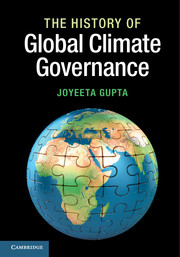Book contents
- Frontmatter
- Dedication
- Contents
- Foreword
- Preface and acknowledgements
- List of abbreviations
- Part 1 Introduction
- Part 2 The history of the negotiations
- 3 Setting the stage
- 4 Institutionalizing key issues
- 5 Progress despite challenges
- 6 The regime under challenge
- 7 Enlarging the negotiating pie (2008–2012)
- Part 3 Issues in global climate governance
- Part 4 Towards the future
- References
- Index
4 - Institutionalizing key issues
The Framework Convention on Climate Change (1991–1996)
from Part 2 - The history of the negotiations
Published online by Cambridge University Press: 05 February 2014
- Frontmatter
- Dedication
- Contents
- Foreword
- Preface and acknowledgements
- List of abbreviations
- Part 1 Introduction
- Part 2 The history of the negotiations
- 3 Setting the stage
- 4 Institutionalizing key issues
- 5 Progress despite challenges
- 6 The regime under challenge
- 7 Enlarging the negotiating pie (2008–2012)
- Part 3 Issues in global climate governance
- Part 4 Towards the future
- References
- Index
Summary
Introduction
The fall of the Berlin Wall in 1989 and the start of an East–West reconciliation process led to renewed global optimism. People expected a ‘peace dividend’ – money that could be dedicated to environmental issues. The successful negotiations on the depletion of the ozone layer provided inspiration as these demonstrated that anthropogenic emissions can have global impacts and that international cooperation was possible to address such a problem. Furthermore, the necessity of linking environmental and developmental issues was on the agenda of the 1992 UN Conference on Environment and Development (UNCED) at Rio, 20 years after the 1972 UN Conference on the Human Environment in Stockholm. This optimism characterized the first half of the decade.
The first phase (see Chapter 3) had set the stage for the climate negotiations. The Intergovernmental Panel on Climate Change (IPCC)’s first scientific report was just being digested by policymakers. Political declarations had crystallized the key issues. The UN Intergovernmental Negotiating Committee (INC) was channelling energies towards negotiating a treaty on climate change and promoting its entry into force. The signs were propitious.
- Type
- Chapter
- Information
- The History of Global Climate Governance , pp. 59 - 77Publisher: Cambridge University PressPrint publication year: 2014



